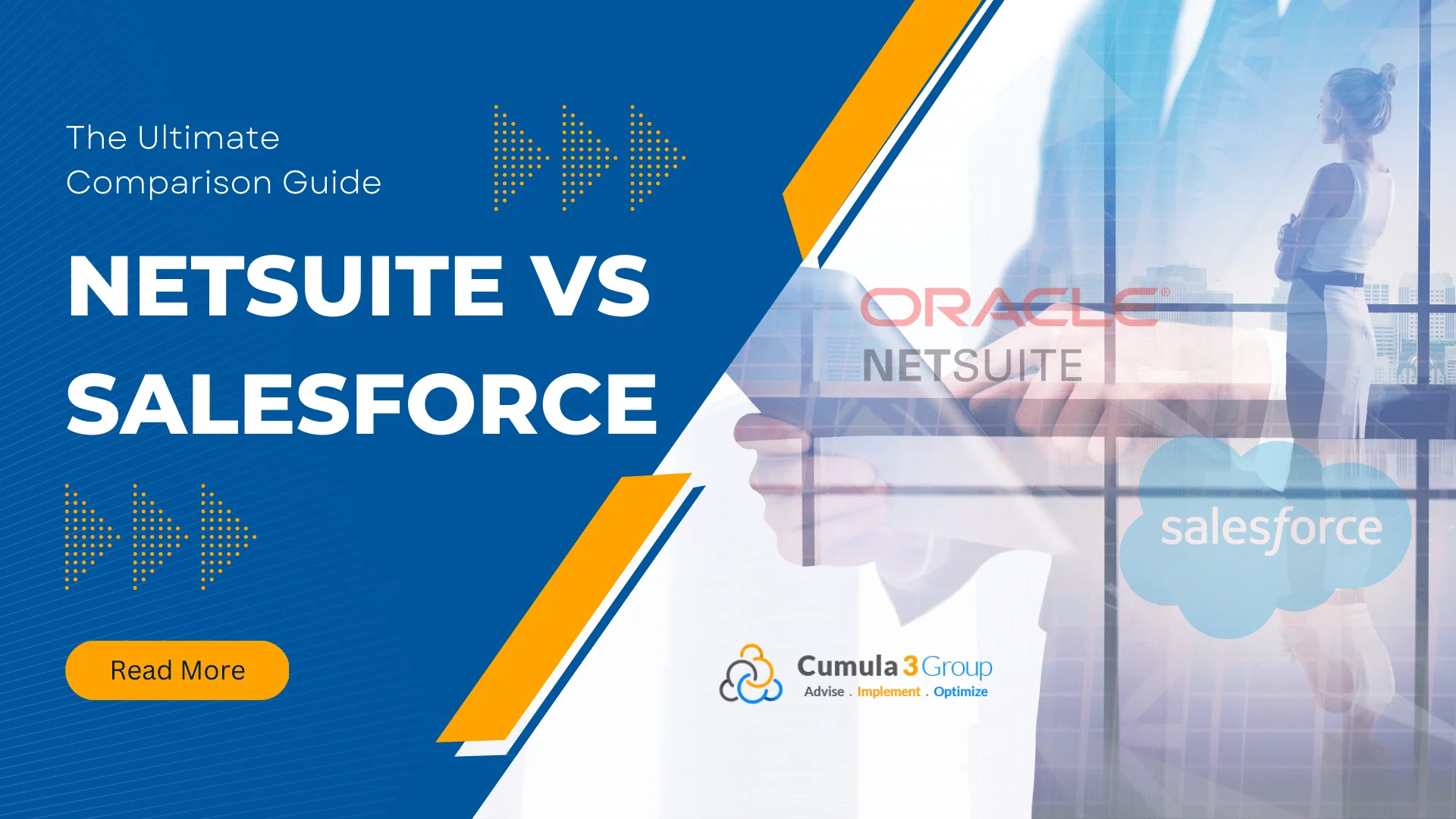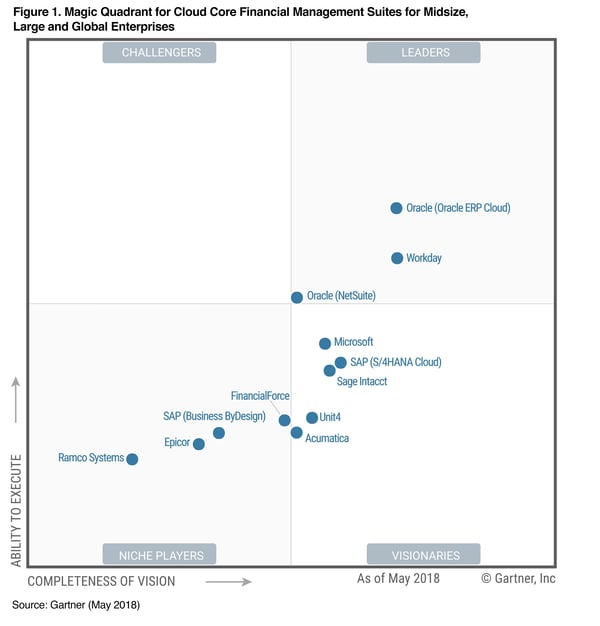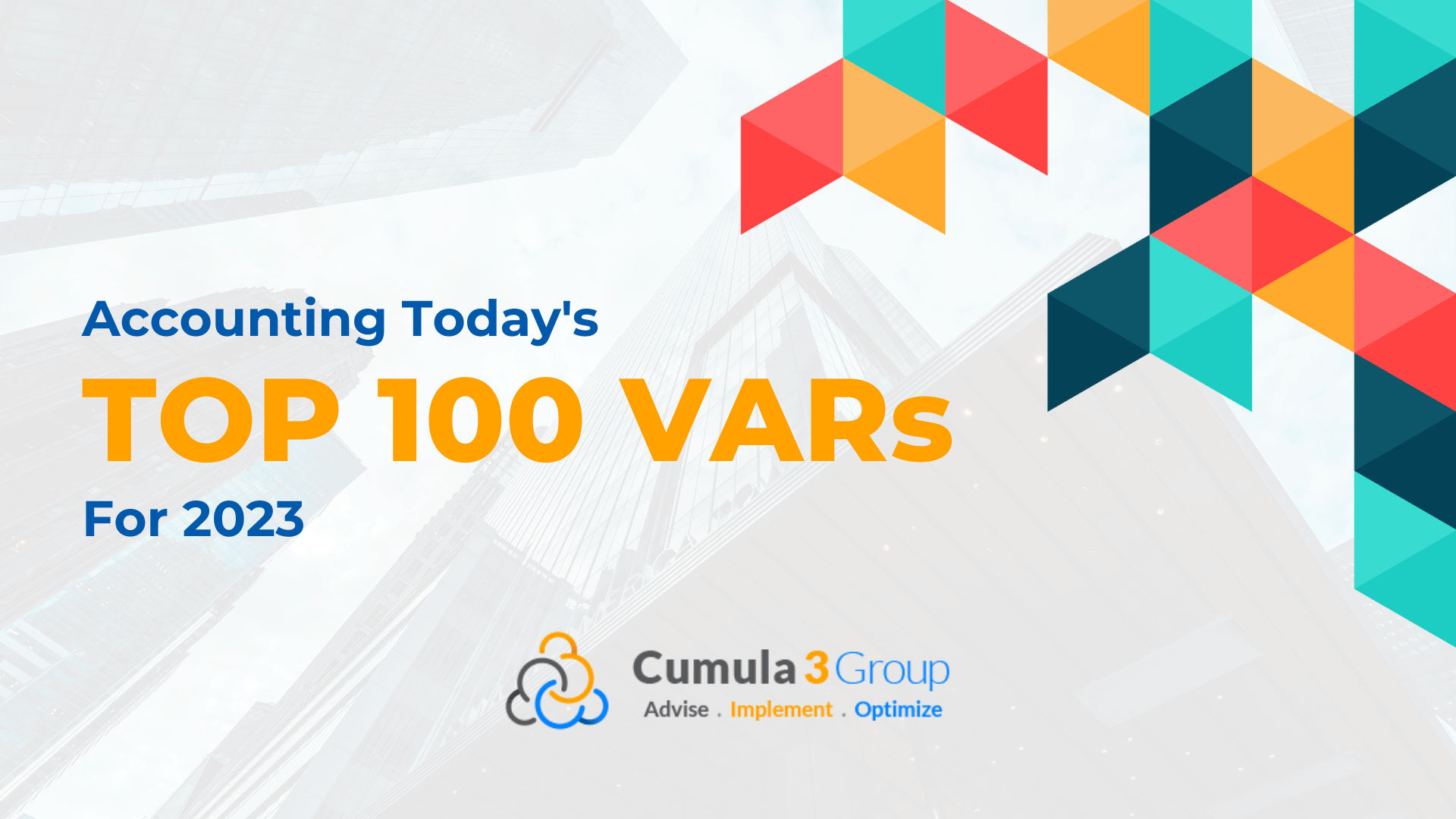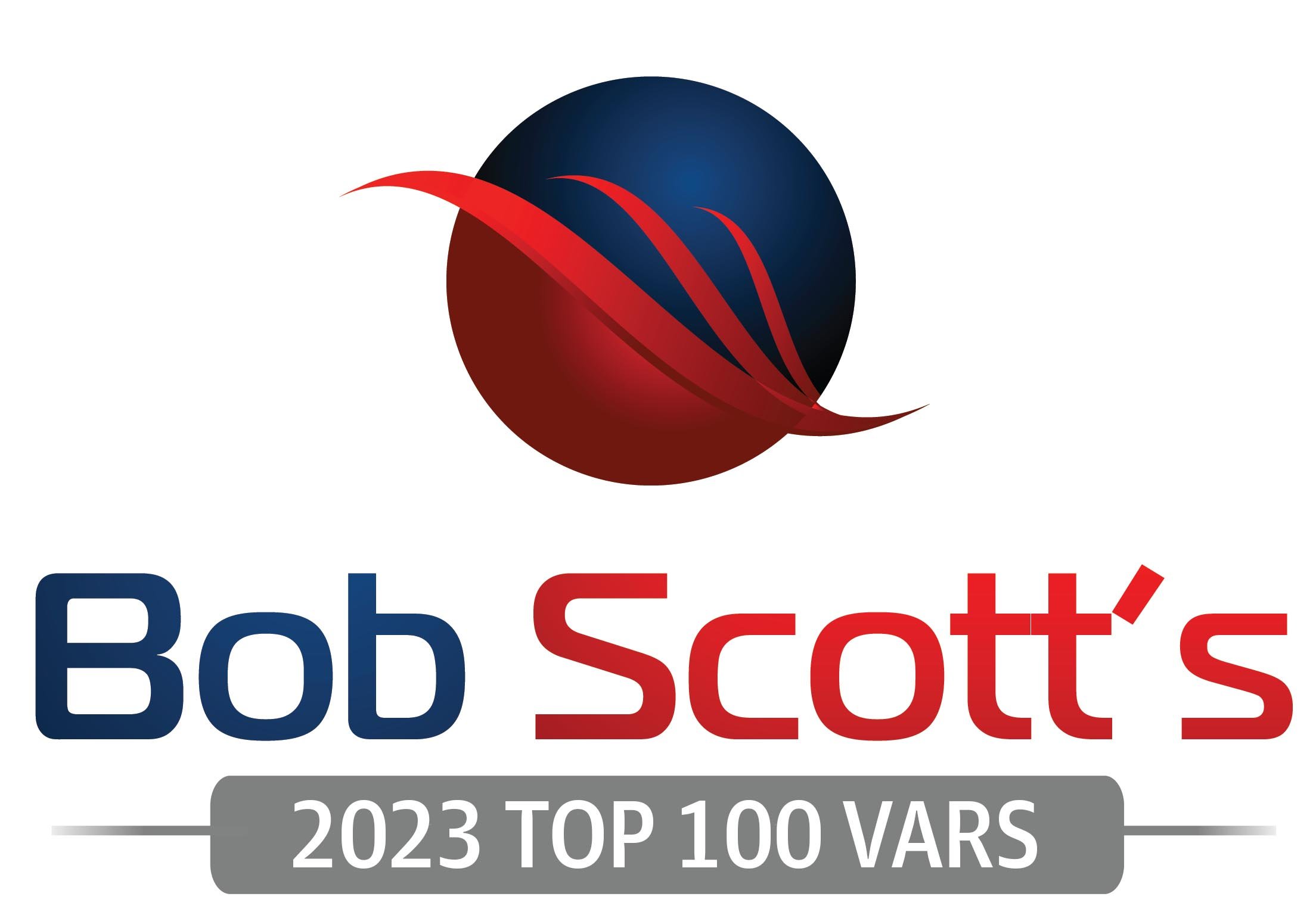Guide to NetSuite Account Reconciliation for Financial Process Efficiency
As organizations grow and evolve, financial management becomes a more complex task. Traditional, manual ways of managing accounts and reconciliations...

This is the most comprehensive NetSuite vs. Salesforce.com comparison guide on the web.
The best part?
I'm going to show you everything you need to consider when comparing NetSuite and Salesforce from a platform, application and ecosystem perspective.
In short: if you want a single online resource to help you during your CRM or ERP evaluation, this should be the one to bookmark for future reference.
Let's get started.
Customer Relationship Management (CRM) software tends to be one of the first major investments companies make in enterprise software because revenue matters.
Let's face it - small, fast-growth companies are constantly juggling several balls in the air, but the #1 thing generally comes down to generating revenue!
With Salesforce.com’s leading brand recognition and ease of getting started with a limited financial commitment, many companies find it a no-brainer to sign on with Salesforce. Plus, it's great software!
However, it's not uncommon to see these initial Salesforce CRM investments become overly customized and morphed into serving business processes they were never intended to serve.
Before you know it, your investment in a CRM system, which was originally intended to scale the business, hits a wall, and you may find yourself being hindered by the inefficiencies and redundancy that come with running a business with overly customized, disparate systems.
Over time, as your company grows and your needs evolve, you may begin to seriously consider whether a leading cloud-based ERP system like NetSuite can help scale your business to the next level.
This almost always brings up the question, "Which is better, NetSuite vs Salesforce?" Now I get this is a bit of a loaded question, but it comes up all the time. And frankly, there is no simple or single answer.
But since you asked the question, let me do my best to help address it.
Let me start by saying, it’s very difficult to make a direct comparison between Salesforce.com vs. NetSuite. There are several ways to analyze this.
Here are just a few:
Option 1: Compare your existing accounting software (e.g QuickBooks) and Salesforce.com (including integration cost & complexity) vs NetSuite (CRM & ERP)
Option 2: Compare Salesforce.com CRM vs. NetSuite (CRM only)
Option 3: Compare Force.com ERP products like FinancialForce, Kenandy, etc. vs. NetSuite (ERP Only)
Option 4: Compare the myriad of other Salesforce products such as Commerce Cloud to NetSuite's SuiteCommerce or Desk.com with NetSuite’s Case Management etc.
For this particular post, we're going to compare and contrast 1) the two technology platforms and ecosystems, 2) the Financial Management offerings (most popular FinancialForce vs. NetSuite), and 3) both CRM offerings.
The Lightning platform is mature and robust, enabling Salesforce's large ISV partner ecosystem (over a thousand) to develop and offer their wares through the Salesforce AppExchange marketplace. The AppExchange offers loads of plugins and extensions available for Salesforce CRM users.
You can check them out here: https://appexchange.salesforce.com/
NetSuite, on the other hand, has its version of the AppExchange referred to as "SuiteApp". While the SuiteApp marketplace is nowhere near the size of Salesforce's AppExchange, there are upwards of a couple of hundred SuiteCloud Development Network (SDN) partners offering various extensions for NetSuite.
The size of the Force.com platform dwarfs NetSuite's SuiteCloud platform in terms of the software developer participants involved. I think this is largely due to the following factors:
That said, the SuiteCloud platform for NetSuite offers a robust platform capable of customizing, scaling, and empowering the operations of some of the largest organizations in the world.
But don't just take my word for it. Here's a quote from an actual NetSuite user:
Customization! Some people are afraid of this, but there is so much power in shaping the system to your needs. Tweaking just the layout of a customer or transaction form can improve efficiency and reduce stress. - Joshua Henke - Q2ebanking
Verdict: Both platforms are more than capable of providing end users with the ability to customize and extend their application through an extensive ecosystem of 3rd party vendors to further enhance their Salesforce or NetSuite investment.
The FinancialForce application is a series of ERP & PSA products sitting on the Force.com platform. It is important to note that while from a marketing perspective, they may appear to be one and the same, FinancialForce is not a Salesforce product or a division of Salesforce.
The history between the two companies originates from Unit4 and Salesforce jointly investing in the FinancialForce application around 2009. Unit4 wanted to take advantage of the growing popularity of Salesforce CRM adoption while rolling out its Force.com ecosystem.
FinancialForce's go-to-market strategy has relied heavily upon Salesforce.com's installed base roughly 85% of FinancialForce’s users are Salesforce.com CRM customers. FinancialForce has expanded its feature set primarily through the acquisition; of Professional Service Automation (PSA) through the Appirio Professional Services Enterprise solution and the Human Capital Management (HCM) solution from VanaWorkforce in 2013.
Due to FinancialForce's strengths & weaknesses, they tend to lead with their Professional Service Automation (PSA) product into larger Professional Services firms that are already using Salesforce. FinancialForce also targets smaller organizations for the full ERP suite (PSA/HCM/ERP) that do not have extensive needs.
NetSuite’s suite of integrated financial management, supply chain (SCM), e-Commerce, professional service automation (PSA) and human capital management (HCM) applications are built on the SuiteCloud platform around a single codebase and database.
This has been NetSuite's story since its inception, to build a single business application around a common set of business processes to provide increased productivity and cost savings.
NetSuite claims there are over 50,000 organizations around the globe using their software in the following industries...software, wholesale distribution, manufacturing, professional services, retail & eCommerce industries, non-profits and more.
NetSuite's primary target market is organizations with 10-1000 employees, essentially anyone large enough to benefit from a completely cloud-based ERP solution.
In recent years, NetSuite has been the primary go-to solution for fast-growth companies that are looking for a QuickBooks alternative. QuickBooks is great for small lean startups, but once you get to a certain size and complexity, you can begin to see the need for more robust functionality in an accounting package, and NetSuite fits the bill for the majority of growing SMBs.
While it's been widely recognized that NetSuite is a great fit for emerging SMBs. Industry analyst Gartner recently announced NetSuite as one of three "Leaders" in their annual Magic Quadrant for Cloud Core Financial Management Suites for Midsize, Large and Global Enterprises. The other two leaders were Oracle (Oracle ERP Cloud) and Workday. 
What's the significance of this?
This acknowledgment from Gartner proves that NetSuite can be a single platform that can serve the needs of an SMB through the enterprise. There are very few, if any, ERP applications in the market that can scale like NetSuite without having to re-platform, re-deploy or re-tool. The investments you make in NetSuite carry on in perpetuity. This is a huge differentiator for NetSuite.
NetSuite’s Product Offering
Verdict: FinancialForce may appeal to customers that are "sold out" on the Salesforce tech stack, but once you consider the number of customers (thousands) successfully running both NetSuite ERP and Salesforce CRM, you quickly realize you don't need to sacrifice the best of breed financials for tight integration. This can be accomplished by leveraging integration products like Celigo's NetSuite - Salesforce Connector.
Salesforce.com’s CRM is easily the most widely deployed CRM application around the world. For organizations seeking a robust CRM solution with a strong ecosystem of service providers and 3rd party extensions, Salesforce.com should be on the shortlist of viable CRM vendors.
However, for really small businesses with simple needs, I'm not so certain Salesforce would be the number #1 choice. Several cloud-based CRM solutions are very affordable (or free) with unique feature sets and value propositions. For example, if you're a really small company with lightweight CRM needs, you should take a look at what HubSpot is doing within the CRM space for both marketing, sales and support. This is particularly true for B2B companies trying to get the most out of inbound marketing efforts.
While NetSuite CRM is adequate for many sales and support organizations, NetSuite’s CRM is rarely considered a stand-alone CRM option. NetSuite CRM shines best for companies that are looking to run their entire business off of a single business application that shares a single database in the cloud, period.
Being able to toggle seamlessly between customer support cases, previous purchase history, transactions, and quotes, and see real-time inventory is a very powerful value proposition for many end users.
My hunch is that for larger companies with traditional sales & marketing and support teams seeking a best-of-breed stand-alone CRM solution, NetSuite would not make the shortlist.
For example, Mark Dille with Workfront claims:
"Salesforce.com the best CRM of all time for all sales people!"
He goes on to say:
"We use Salesforce daily to connect with potential new customers and keep track of our interaction with both current customers as well as potential buyers. The notes that we keep are invaluable because they make our interactions both meaningful and productive." - Mark Dille Workfront via Trust Radius
I'd argue that business leaders that have gone through the headaches of having data in multiple systems utilizing the entire NetSuite stack for sales, financial management, fulfillment, support, HR and more might be a breath of fresh air.
Verdict: In a vacuum, Salesforce.com CRM is the better CRM solution for many sales & support organizations due to its deep feature set, refined UI, ease of reporting, and large user adoption. However, software selections are always more nuanced than this. There very well could be situations where NetSuite CRM, one of Salesforce alternatives, makes both functional and economic sense. There isn't a right or wrong approach it all comes down to your preferences and goals and working with the right vendors to help you with your evaluation.
Several years ago, NetSuite use to leverage the "One Platform No Limits" tagline in their marketing collateral. My hunch is that this mantra resonated with business leaders that have run companies unsuccessfully on disparate systems.
In the last 5 years or so, this sort of sloganeering has essentially disappeared due to the fact that most companies want to leverage best-of-breed solutions at the departmental level wrapped around a core suite of applications.
So, do you want best-of-breed financial management?
Best of breed CRM? Integrated?
You can have it all, with both NetSuite & Salesforce utilizing a plug & play connector like Celigo's NetSuite Salesforce Connector, built on Celigo’s integrator.io platform, the iPaaS (Integration Platform-as-a-Service) is designed for IT professionals and business users who want to quickly connect applications to automate business processes.
Prebuilt, comprehensive integrations between popular cloud platforms like NetSuite and Salesforce, can be quickly installed and configured without IT any additional resources.
When Salesforce and NetSuite are integrated, it creates a unified bridge between two industry-leading cloud-native platforms. That means that when your business grows and changes, you're not limited to a certain number of fields that can pass between the two, nor will you need a third party to rebuild an integration.
This integration greatly increases the communication between sales and finance departments and allows companies to maintain their relationships with Salesforce. With more companies using cloud-based applications, this provides an easy way to leverage a best-of-breed approach while integrating two leading applications with a plug-and-play connector.
Net net, both Salesforce.com and NetSuite provide great software and can offer potential advantages for your organization. It’s always a good idea to request a demo, attend webinars, and read real-life user reviews on websites like G2Crowd, Trust Radius, Software Advice or read up on what the analyst has to say, such as Gartner or Forrester.

As organizations grow and evolve, financial management becomes a more complex task. Traditional, manual ways of managing accounts and reconciliations...

Cumula 3 Group is proud to announce its appearance on the prestigious Accounting Today's VAR 100 list for 2023. This notable directory highlights...

Cumula 3 Group Marks Its First Appearance in Bob Scott's Top 100 VARs for 2023 The esteemed Cumula 3 Group is proud to announce its debut on Bob...